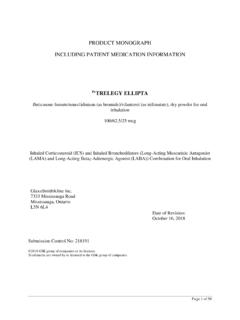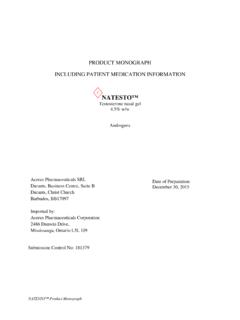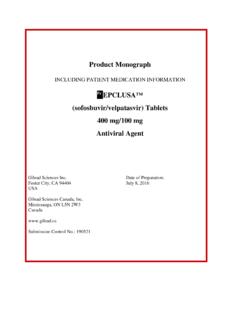Transcription of PRODUCT MONOGRAPH INCLUDING PATIENT …
1 FOQUEST (methylphenidate hydrochloride CR capsules) Page 1 of 37 PRODUCT MONOGRAPH INCLUDING PATIENT medication information FOQUEST methylphenidate hydrochloride Controlled Release Capsules 25, 35, 45, 55, 70, 85 and 100 mg Professed Standard Central Nervous System Stimulant Purdue Pharma 575 Granite Court Pickering, Ontario L1W 3W8 Date of Preparation: December 05, 2017 Submission Control No: 187330 FOQUEST and MLR are trademarks of Purdue Pharma FOQUEST (methylphenidate hydrochloride CR capsules) Page 2 of 37 TABLE OF CONTENTS PART I: HEALTH PROFESSIONAL information .. 3 SUMMARY PRODUCT information .. 3 INDICATIONS AND CLINICAL USE.
2 3 CONTRAINDICATIONS .. 4 WARNINGS AND PRECAUTIONS .. 5 ADVERSE REACTIONS .. 10 DRUG INTERACTIONS .. 17 DOSAGE AND ADMINISTRATION .. 18 OVERDOSAGE .. 20 ACTION AND CLINICAL PHARMACOLOGY .. 21 STORAGE AND STABILITY .. 24 DOSAGE FORMS, STRENGTHS, COMPOSITION AND PACKAGING .. 24 PART II: SCIENTIFIC information .. 26 PHARMACEUTICAL information .. 26 CLINICAL TRIALS .. 27 DETAILED PHARMACOLOGY .. 28 TOXICOLOGY .. 28 PATIENT medication information .. 30 FOQUEST (methylphenidate hydrochloride CR capsules) Page 3 of 37 FOQUEST methylphenidate hydrochloride Controlled Release Capsules PART I: HEALTH PROFESSIONAL information SUMMARY PRODUCT information Route of Administration Dosage Form / Strength Non-medicinal Ingredients Oral Controlled Release Capsules 25, 35, 45, 55, 70, 85 and 100 mg ammonio methacrylate copolymer dispersion (type B), anionic copolymer (consisting of methyl acrylate, methyl methacrylate and methacrylic acid), glyceryl monostearate, hypromellose, polyethylene glycol, polysorbate, silicon dioxide, sodium hydroxide, sodium lauryl sulfate, sorbic acid, sugar spheres, triethyl citrate INDICATIONS AND CLINICAL USE FOQUEST (methylphenidate hydrochloride controlled release capsules)
3 Is indicated for the treatment of Attention Deficit Hyperactivity Disorder (ADHD) in: Adults ( 18 years of age) Geriatrics (>65 years of age): FOQUEST has not been studied in the geriatric population (>65 years of age). Pediatrics (<18 years of age): FOQUEST should not be used in patients under 18 years of age, since the safety and efficacy in this age group have not been established. A diagnosis of ADHD (DSM-5) requires the presence of hyperactive-impulsive or inattentive symptoms that caused impairment and that were present before the age of twelve. The symptoms must be persistent, must be more severe than is typically observed in individuals at a comparable level of development, must cause clinically significant impairment, in social, academic, or occupational functioning, and must be present in two or more settings, school (or work) and at home.
4 The symptoms must not be better accounted for by another mental disorder. For the Inattentive Presentation, at least 6 of the following symptoms (5 for adult ADHD patients ) must have persisted for at least 6-months: lack of attention to details or careless mistakes, lack of sustained attention, poor listener, failure to follow through on instructions and tasks, poor organization, avoids tasks requiring sustained mental effort, loses things, easily distracted, forgetful. FOQUEST (methylphenidate hydrochloride CR capsules) Page 4 of 37 For the Hyperactive-Impulsive Presentation, at least 6 of the following symptoms (5 for adult ADHD patients ) must have persisted for at least 6-months: fidgeting or squirming, leaving seat, inappropriate running or climbing, difficulty with quiet activities, "on the go," excessive talking, blurting answers, can't wait turn, intrusive.
5 For a Combined Presentation diagnosis, both inattentive and hyperactive-impulsive criteria must be met. Special Diagnostic Considerations: The specific etiology of ADHD is unknown, and there is no single diagnostic test. Adequate diagnosis requires the use not only of medical but of special psychological, educational, and social resources. Learning may or may not be impaired. The diagnosis must be based upon a complete history and evaluation of the PATIENT and not solely on the presence of the required number of DSM-5 characteristics. Need for Comprehensive Treatment Program: FOQUEST is indicated as an integral part of a total treatment program for ADHD that may include other measures (psychological, educational and/or social) for patients with this syndrome.
6 Drug treatment may not be indicated for all patients with this syndrome. Drug treatment is not intended for use in the PATIENT who exhibits symptoms secondary to environmental factors and/or other primary psychiatric disorders, INCLUDING psychosis. Appropriate educational placement is essential in patients with this diagnosis and psychosocial intervention is often helpful. When remedial measures alone are insufficient, the decision to prescribe drug treatment will depend upon the physician's assessment of the chronicity and severity of the PATIENT 's symptoms and on the level of functional impairment. Long-Term Use: The effectiveness of FOQUEST has been evaluated for more than four weeks in placebo-controlled clinical trials (see CLINICAL TRIALS).
7 If electing to use FOQUEST for extended periods, the long-term usefulness of the drug for the individual PATIENT should be periodically re-evaluated ( see DOSAGE AND ADMINISTRATION). CONTRAINDICATIONS Known hypersensitivity to methylphenidate hydrochloride or to any ingredient in the formulation or component of the container. For a complete listing of excipients, see DOSAGE FORMS, STRENGTHS, COMPOSITION AND PACKAGING Known hypersensitivity or idiosyncrasy to the sympathomimetic amines patients with anxiety, tension, agitation Thyrotoxicosis Advanced arteriosclerosis Symptomatic cardiovascular disease Moderate to severe hypertension Glaucoma patients with a history of drug abuse FOQUEST (methylphenidate hydrochloride CR capsules) Page 5 of 37 patients with motor tics or with a family history or diagnosis of Tourette s syndrome (verbal tics) During or within 14-days following the administration of monoamine oxidase inhibitors (hypertensive crises may result)
8 (see DRUG INTERACTIONS, Drug-Drug Interactions) WARNINGS AND PRECAUTIONS Serious Warnings and Precautions Drug Dependence (see WARNINGS AND PRECAUTIONS, Dependence/Tolerance) General Drug treatment is not indicated in all cases of ADHD and should be considered only in light of the complete history and evaluation. The decision to prescribe FOQUEST should depend on the physician s assessment of the chronicity and severity of the PATIENT s symptoms. Treatment should not depend solely on the presence of one or more abnormal behavioural characteristics. Where these symptoms are associated with acute stress reactions, treatment with methylphenidate is usually not indicated.
9 All drugs with sympathomimetic effects prescribed in the management of ADHD should be used with caution in patients who: a) are involved in strenuous exercise or activities, b) use other stimulants, or c) have a family history of sudden/cardiac death. Prior to the initiation of treatment, a personal and family history ( INCLUDING assessment for a family history sudden death or ventricular arrhythmia) and physical exam should be obtained to assess for the presence of cardiac disease. In patients with relevant risk factors and based on the clinician s judgement, further cardiovascular evaluation may be considered ( , electrocardiogram and echocardiogram). patients who develop symptoms such as exertional chest pain, unexplained syncope, or other symptoms suggestive of cardiac disease during ADHD treatment should undergo a prompt cardiac evaluation.
10 Plasma Concentration of FOQUEST: Pharmacokinetic studies show that after dosing FOQUEST 100 mg, there is approximately 9 -20% residual methylphenidate in the blood at 24 hours. Fatigue: FOQUEST should not be used for the prevention or treatment of normal fatigue states. Carcinogenesis and Mutagenesis See TOXICOLOGY section. FOQUEST (methylphenidate hydrochloride CR capsules) Page 6 of 37 Cardiovascular Sudden Death and Pre-existing Structural Cardiac Abnormalities or Other Serious Heart Problems: Adolescents: Sudden death has been reported in association with stimulant drugs used for ADHD treatment at usual doses in children and adolescents with structural cardiac abnormalities or other serious cardiac problems.










